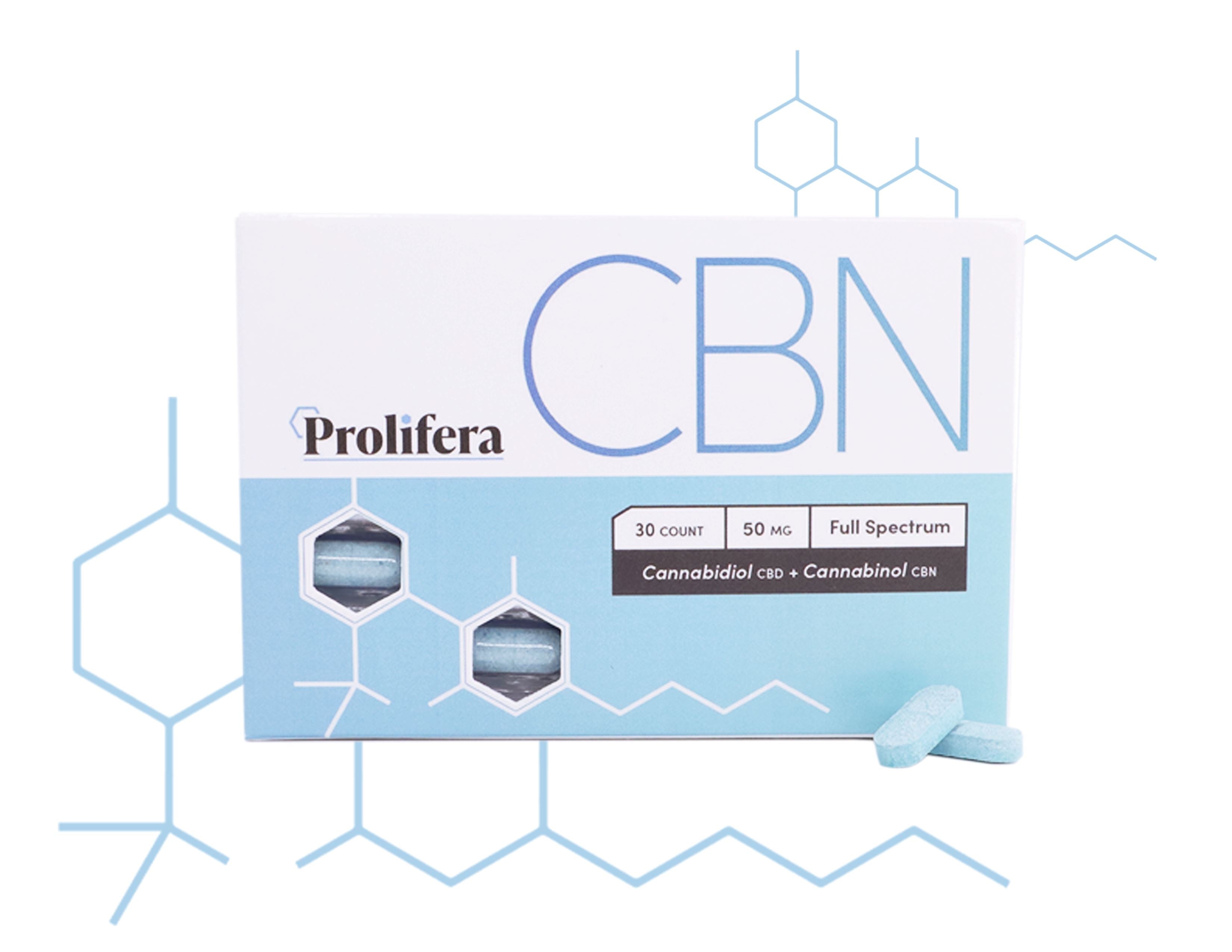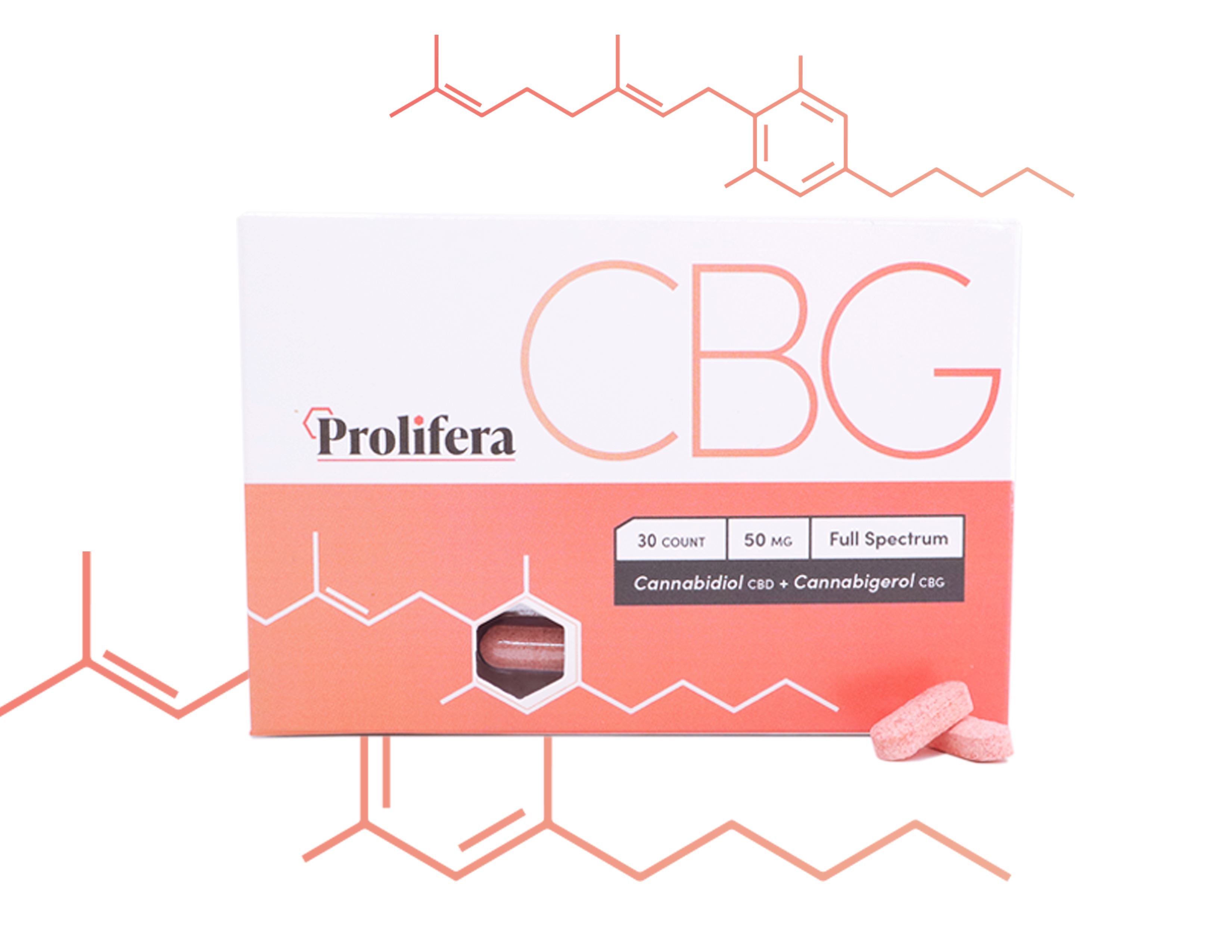What is The Buzz About CBN?

Cannabinol (CBN) is a mildly psychoactive minor cannabinoid, one of over 100 phytocannabinoids (cannabinoids from a plant) found in both marijuana and hemp plants. Through interaction with the body’s own endocannabinoid system, phytocannabinoids help to keep our bodies in homeostasis, or balance. CBN’s potential health benefits are showing much promise as a stand-alone cannabinoid as well as combined with other plant compounds to produce a desired synergistic effect in our bodies.
CBN is derived from tetrahydrocannabinol (THC) and is commonly found in aged cannabis plants. It is part of a group of specific phytocannabinoids along with THC that fits into and activates our body’s CB1 and CB2 receptors like a lock and key. When the binding occurs, it prompts the receiving neuron to respond. These messages are passed along through cellular responses and are required for homeostasis. Plant-based cannabinoids act as a supplement in cases where there is an internal (endo) cannabinoid deficiency in our bodies. They can help bring about a balance that is not being reached within the body’s own endocannabinoid system.
How CBN is Produced
There is no way to produce a high-CBN strain of cannabis because a live, growing plant will not have any CBN in it. CBN is a result of an oxidative process within the plant after it is harvested.
The amount of CBN produced from the bud depends on different factors, such as the levels of THC in the flowers as well as exposure to light, heat, and time. CBN is most commonly found after prolonged storage, especially at higher temperatures.
The basis of all known cannabinoids is cannabigerolic acid (CBGA) which is biosynthesized in the living cannabis plant. CBGA combines with other chemical compounds to make tetrahydrocannabinolic acid (THCA) and other acids during THC synthase. Next, the THCA loses hydrogen atoms in this oxidation process when exposed to air over time, resulting in CBNA (the acid form of CBN). The end product is CBN after the material is exposed to heat or ultraviolet light.
CBN Benefits
CBN use as a mild sedative and sleep aid is commonly found effective by many people across the globe but quantitative research has not proven its effectiveness.The good news is that there are preliminary studies that support its many beneficial properties as well as a wealth of positive anecdotal evidence for several ailments. Many of the studies that have been done are dated and are not human trials, warranting further study. As with other cannabinoids, there are barriers to research both federally and on the state level which make it more difficult to find an excess of empirical data proving its efficacy. The apparent lack of harmful side effects make it a viable option for those people seeking a more natural alternative to pharmaceuticals.
Anti-Inflammatory
Bodily inflammation in excess causes illness. In extreme cases it will lead to various types of debilitating autoimmune diseases. CBN has been shown to work as an anti-inflammatory agent, reducing inflammation in the body by helping to modulate the levels of endocannabinoids. They ultimately impact levels of other compounds including immune cells thereby keeping the inflammation in check.
Antibacterial
Methicillin-resistant Staphylococcus aureus (MRSA) infection is caused by a type of staph bacteria that's become resistant to many of the antibiotics used to treat ordinary staph infections. Researchers tested the effects and found that CBN in addition to other cannabinoids, has potent antibacterial effects. Although the specific biochemical mechanisms have not been identified yet, the clinical relevance remains as a potential MRSA treatment.
Anticonvulsant
An anticonvulsant is a compound capable of reducing seizures. Many anticonvulsant medications today have many harmful side effects and may not even be very effective for some seizure disorders. Animal Research has found that CBN is almost as effective an anticonvulsant as THC and may even extend seizure latency. Especially in states where THC is not legal, CBN may prove to be an effective alternative for some people.
Cancer Therapy
A 2020 Canadian study found that “Cannabinol inhibits proliferation and induces cell cycle arrest and apoptosis in glioblastoma, hepatocellular carcinoma and breast cancer cells”. CBN produces this effect by inducing cell cycle arrest and apoptosis which programs cell death. This data highlights the medicinal potential of CBN in anti-cancer therapy.
Chronic Pain Relief
This study found that CBN alters the pain signals that are sent to the brain by the neurons. CBN might play a more significant role than initially thought in relieving pain. As CBN comes from degraded THC, it is not totally surprising that it may have similar benefits without the extreme psychotropic effects and potentially negative legal ramifications.
A rat study in Archives of Oral Biology found that CBD and CBN had an analgesic effect, reducing myofascial pain similar to chronic pain disorders. They found that CBD and CBN alone and in combination reversed masseter muscle sensitization in a behavioral model of temporomandibular disorders. CBN has the ability to reduce pain without the effects of being “high”.
Increased Appetite
A study in Psychopharmacology notes that rats given CBN had an increased appetite, a similar effect of THC. The study found that when rodents consumed CBN, they ate larger portions of food more regularly and for longer. The likely reason for this is the impact of CBN on the CB1 receptor. As CBN has a far weaker psychoactive effect than THC, it is an alternative option for those who have wasting syndrome or have diminished appetite due to chemotherapy or other medical interventions.
Psoriasis
This troubling skin condition that leads to the creation of flaky, crusty, red patches of skin. In some cases, silvery scales cover them and become hyperactive, grow, and create the flaky skin patches. Preliminary research suggests that CBN decreases keratinocytes (a type of skin cell) proliferation. As CBN may help to reduce the process and alleviate the symptoms of this skin condition, it has potential as a component in topical applications. In this lab study CBN also seemed to soothe inflamed skin by modulating TRPV2 receptors.
Vasorelaxation and Glaucoma
Vasorelaxation is the process of relaxing blood vessel walls, which results in the fall of blood pressure. CBN may act as a vasorelaxant, which means it is useful if you have a condition such as glaucoma. It may increase the blood flow to the eyes via vasorelaxation, and reduce pressure in the eye. The process is also helpful for people with conditions, such as heart disease, or hypertension. This 1984 glaucoma cat study revealed that both CBN and CBG caused reductions in intraocular tension.
Choosing the Best Product
The safest and most reliable CBN products are created by isolating the cannabinoid from hemp by using sophisticated extraction techniques that leave little to no residue. Utilizing an isolated form is a great choice for minimizing the possibility of trace THC content which may be detected if undergoing drug testing or if there are concerns about grabbing the attention of law enforcement in countries or states where THC is illegal. CBN is not listed in the United Nations’ controlled substances schedules.
Combining different cannabis products in order to get the best of CBN, CBD and other cannabinoids’ entourage benefits may be a point to consider. The various compounds in cannabis including terpenes and flavonoids work together, and may produce a more effective result than when taken alone.
As with CBD products, CBN products aren’t regulated by the FDA. A supplement manufacturer doesn’t legally need to test their products or get a license. This is a paramount reason to not only read the label carefully but to also purchase from a reputable company. A reputable company will be transparent and provide easily accessible certificates of analysis (COA) from third-party laboratories on the batches and lots. These lab reports or COAs, confirm the cannabinoid make-up of the product and should also indicate the presence or lack thereof of any contaminants of heavy metals, molds, and pesticides.
Things to Consider
There are no known harmful side effects of CBN, but that doesn’t mean they may not exist. CBN simply hasn’t been studied enough to know. Inexperienced users may feel drowsy, dizzy or lose their appetite if larger quantities are consumed. As is recommended with other cannabinoids, it is a good idea to start on a lower dose and increase slowly until the sweet spot or desired effect is found.
It’s always a good idea to speak to your healthcare provider before trying any supplement, including CBN. If you are taking pharmaceuticals that are processed in the liver via cytochrome P450 enzymes, there is a chance the efficacy of the pharmaceutical can be affected as may also be the case with CBD. Some common medications that are broken down by cytochrome enzymes include, statins (taken for high cholesterol), antibiotics, anticonvulsants, and antidepressants.





Leave a comment
This site is protected by hCaptcha and the hCaptcha Privacy Policy and Terms of Service apply.